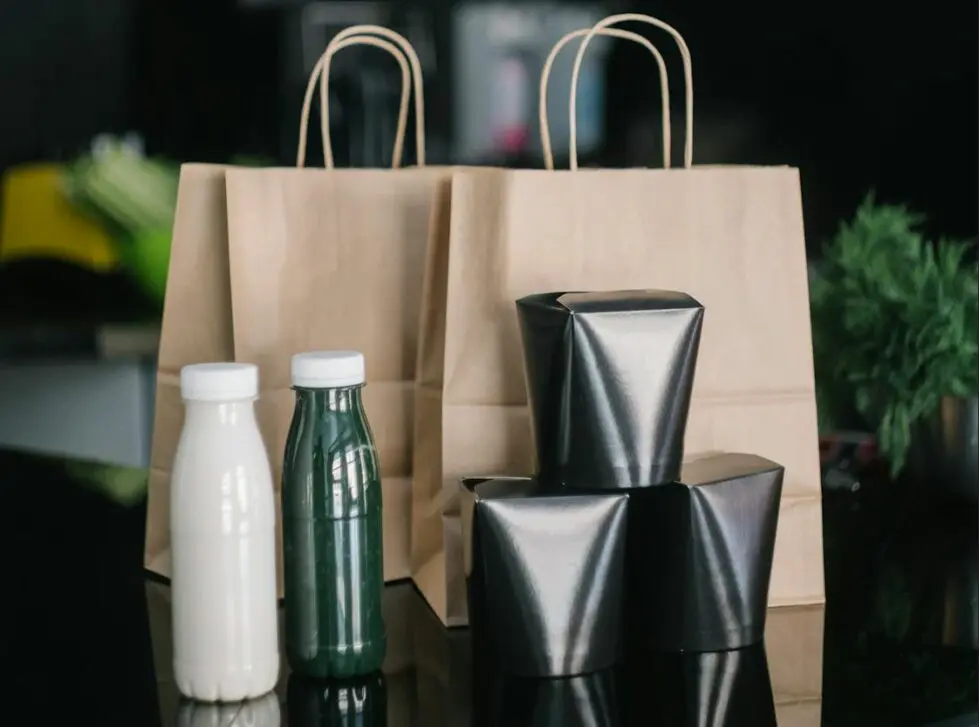

A proposed law would allow home delivery of wind, beer and cocktails, expanding pandemic food and drink takeout rules. Photo by Mikhail Nilov/Pexels
A Delaware Senate bill that will allow state residents to have home delivery of alcohol in the form of wine, beer and mixed cocktails from restaurants, brewpubs and taverns is one step closer to becoming a law, despite opposition from Delaware’s liquor stores.
Senate Bill 166, sponsored by Sen. Jack Walsh, D-Wilmington, blew through the House Economic Development/Banking/Insurance & Commerce Committee Tuesday.
It would allow third parties like DoorDash and Uber Eats to bring limited quantities of wine and beer — and as-yet unlimited quantities of mixed cocktails — to customers, as long as they are accompanied by an order of at least $10 for food of some kind.
Edward Mulvihill, a fourth-generation owner of Peco’s Liquor Store in North Wilmington, argued that the arrangement would hurt liquor store sales that are now experiencing historic sales declines and would facilitate underage drinking.
Delaware’s liquor licenses include one for restaurants for on-site consumption and one for retail package stores to sell products for off-site consumption, he pointed out.
“In the years since COVID, we’ve seen this line become more and more blurred,” Mulvihill told the committee.
During the lockdown, the state Legislature changed Delaware’s laws to allow customers to take out alcohol with food, a key measure designed to keep the state’s restaurants afloat in the early part of the economy-roiling pandemic.
While Mulvihill said he was pleased that under the bill deliveries of wine would be limited to only two bottles, he was unhappy about the unlimited number of cocktails, as was Rep. Paul Baumbach, R-Newark.
Before voting for the bill, Baumbach asked Walsh to consider amending the bill by putting a limit on the number of mixed drinks that could be ordered under the law.
DoorDash delivery rules
A DoorDash rep said that company already delivers alcohol in 32 states and its system has been working well.
It hires only drivers older than 21 to deliver drinks. To order alcohol for delivery, a customer must upload a license showing they are old enough to order it.
When the alcohol is delivered, it does not have to be delivered to the person who ordered it, but must be delivered to someone with a license or ID showing they are old enough to receive it. The other person often is the spouse or partner of the person who placed the order, the rep said.
The company does not allow alcohol to be left on a doorstep, as food can be, he said. If no one answers the door,, the delivery person is paid by DoorDash to return the alcohol to the restaurant from which they picked it up, the rep said.
The company monitors its orders for unusual activity and deliveries looking for red flags, he said.
In addition, the company trains its delivery personnel in laws about possessing, purchasing and consuming alcoholic beverages; acceptable forms of identification; how to detect fake and altered forms of identification; signs of intoxication; and reasons to refuse delivery, including that a consumer failed to provide valid identification, was underage, or displayed signs of intoxication.
IN THE NEWS: UD breaks ground on $150M Sabre bio-pharma center
The bill would allow bottles of cider to be delivered, because they are defined as wine, but not bottles of mead, because they are made with honey and are not counted under the law as a wine, said Delaware Alcohol Commissioner Jacqueline Paradee Mette.
However, under the bill, cider could not be delivered in cans, noted Rep. Jeff Spiegelman, R-Claymont.
“I think that would be a very literal interpretation of that provision, yes,” Mette answered him.
Spiegelman voted for the bill, despite watching a bill of his to allow shipment of alcohol into Delaware die in the same Senate committee hearing that allowed the delivery bill to move on.
“I did sign on to that bill as a co sponsor because at the end of the day, it’s more important to get things done on behalf of the State of Delaware, regardless of whose idea it is or whose bill it is,” Spiegelman said Tuesday afternoon. “It’s more important to get things done, to do the right thing.
“Having said that, I do find it interesting that representatives who in my bill hearings said they would not support an idea like this, not just this bill, but an idea like this, ended up voting that bill out of committee.”
One of the difficulties that his bill to ship alcohol faced was the state’s three-tiered system, with producers on top, wholesalers in the second tier and liquor stores and restaurants in the third tier.
Walsh’s bill was for delivery, not shipment, Spiegelman pointed out.
“There’s is a big difference,” he said. “”One of the things that has been challenging to get direct shipment of alcohol is because direct shipment would bypass two of the three tiers.”
HB166 must go the House Revenue and Finance Committee for a hearing before being cleared to moved to the House floor.


Betsy Price is a Wilmington freelance writer who has 40 years of experience.
Share this Post








